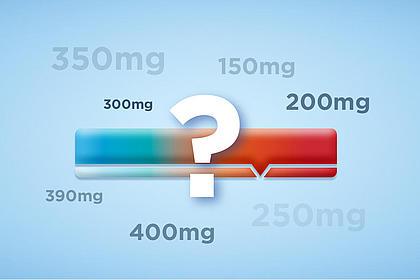Magnesium bei Augenlidzucken

Wenn Ihr Auge unkontrolliert zuckt, steckt meist keine gefährliche Erkrankung dahinter. Oftmals hören die Beschwerden von selbst wieder auf. Tritt das Augenzucken über einen längeren Zeitraum auf, kann dies unterschiedliche Gründe haben. Eine der Ursachen von Augenlidzucken kann Magnesium-Unterversorgung sein. Dieser kann durch Stress, eine einseitige Ernährung und andere Faktoren ausgelöst werden. Lernen Sie im folgenden Artikel die Zusammenhänge zwischen Lidzucken und Magnesium kennen.
Nervöses Augenlidzucken durch Magnesium-Unterversorgung
Der Zusammenhang zwischen Lidzucken und Magnesium lässt sich am besten nachvollziehen, wenn man sich die neuronalen Aufgaben von Magnesium vor Augen führt. Magnesium stabilisiert die Zellmembranen von Nerven- und Muskelzellen. Bei normaler Funktion leiten die Zellmembranen Impulse bzw. Reize erst ab einer bestimmten Stärke an Zellen weiter.
Enthalten die Zellmembranen zu wenig Magnesium, lassen sie bereits schwächere Reize durch. Zellen und deren Bindeglieder, die Synapsen, werden schneller und leichter erregt. Dies kann zu unkontrollierten Zuckungen am Lidmuskel führen. Da die Haut rund um Ihre Augen sehr dünn ist, spüren Sie die Zuckungen oder das Flattern am Augenlid deutlicher als bei anderen Muskeln.
Ständiger Stress. Ständiges Augenzucken.
Magnesium entspannt die Muskeln. Andauernder Stress kann jedoch zu einem Ungleichgewicht zwischen Magnesium und Calcium führen. Ihre Lidmuskeln können nicht mehr richtig entspannen – es kommt zum Zucken des Lidmuskels, kurzum zu Augenlidzucken.
Stress gilt als einer der häufigsten Auslöser von unkontrolliertem Augenzucken. Zugleich ist Stress ein Risikofaktor für Magnesium-Unterversorgung. Sind Sie gestresst, sind Ihre Lidmuskeln angespannt. Um Energie zu gewinnen, schüttet Ihr Körper Hormone wie Cortisol aus. Je länger der Stress anhält, desto mehr Energie benötigt Ihr Körper. Dies kann dazu führen, dass Ihre Magnesium-Reserven nach und nach geleert werden. Denn der erhöhte Cortisolspiegel führt dazu, dass die Nieren Magnesium aus dem Blut filtern und das Anti-Stress-Mineral über den Urin ausgeschieden wird.
Weitere Ursachen von Augenlidzucken im Zusammenhang mit Magnesium
Neben Stress gibt es noch folgende Faktoren, die eine Magnesium-Unterversorgung hervorrufen und zu Augenlidzucken führen können:
- Schwangerschaft: Bei Schwangeren und Stillenden kann Augenzucken bei unzureichender Versorgung mit dem Mineral in Erscheinung treten. Magnesium ist für die Gesundheit von Mutter und Kind unverzichtbar. Daher sollte auf eine ausreichende Zufuhr des Minerals geachtet werden.
- Sport: Augenlidzucken kann vermehrt bei Sportlern auftreten, da ein Magnesium-Verlust durch Schwitzen begünstigt wird. Wer viel Sport treibt, sollte auf eine ausreichende Magnesiumversorgung achten, um Augenzucken vorzubeugen oder entgegenzuwirken.
- Einseitige Ernährung und Augenlidzucken: Magnesium ist ein wichtiger Mineralstoff, der vom Körper nicht selbst hergestellt werden kann. Umso wichtiger ist es auf eine gesunde, magnesiumreiche Ernährung zu achten. Außerdem kann der Konsum von Koffein, Nikotin, Alkohol und Stress die Ausscheidung von Magnesium erhöhen und so zu Augenzucken führen.
Ausreichend Magnesium? Was Sie noch gegen Augenzucken tun können
Die folgenden Tipps können Ihnen helfen, störendem Lidflattern entgegenzuwirken:
- Entspannungsübungen: Leichtes Massieren der Augen- und Lidpartie
- Mehrmaliges Gähnen gegen Krämpfe in den Lidmuskeln
- Neben einer ausreichenden Magnesiumversorgung sollten Sie auch auf eine ausreichende Aufnahme von Vitamin B achten. Zahlreiche pflanzliche und tierische Lebensmittel (z. B. Kartoffeln, Avocado, Nüsse und Fleisch, Fisch und Milchprodukte) enthalten wertvolle B-Vitamine. Alternativ kann die Aufnahme über B-vitaminhaltige Nahrungsergänzungsmittel, wie Biolectra® Magnesium 400 mg Nerven & Muskeln Vital, gezielt gefördert werden.
- Erholung der Augen durch Ruhepausen: Vor allem bei langer Arbeit an Bildschirmen ist eine Erholung der Augen sehr wichtig. Frische Luft und eine Aktivität ohne Bildschirm sind in diesem Fall empfehlenswert.
Sollte trotz ausreichender Magnesiumversorgung und Entspannung der Augen ein anhaltendes Zucken auftreten und keine Besserung der Beschwerden eintreten, empfehlen wir Ihnen die Meinung eines Arztes einzuholen.


